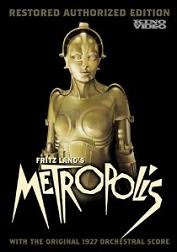
To call 1927's Metropolis just a classic would be equal to devaluating it. There have been lots of classic movies through the years but not so many of them have been called prophetic, the first science-fiction masterpiece in cinema or highly influential. Fritz Lang's Metropolis is easily all of these and maybe more. It is probably one of the very few films of such an old age that still plays very well nowadays. And it's a pleasure to find out countless prototypes of future movies' characters, machines, cities, etc. while watching it.
Metropolis tells the story of a futuristic city divided into two well defined halves, each of them ignorant of the other. The first society, living on the surface, is wealthy, educated and running the whole town. The second one, living underground, consists of near slaves forming the working power of Metropolis. Freder (Gustav Froehlich) is the son of Joh Fredersen (Alfred Abel), the mastermind of the city. One day Freder sees Maria (Brigitte Helm), a beautiful woman, who is visiting upper Metropolis with a group of children and he falls in love with her. He starts looking for the girl and in the process he discovers the underground worker's city.
Freder witnesses a plant failure and astonished by the hard conditions under which the people are working he complains to his father. Joh Fredersen is not very impressed by the news he already knows and he orders the Thin Man (Fritz Rasp) to watch what his son is doing. Freder goes underground once again and trades his clothes and place with one of the workers. Subsequently, he finds Maria prophesying about a mediator - a "heart" to connect the "head" (the citizens above) with the "hands" (the workers) of Metropolis. Freder decides to help his working brothers while meanwhile his father goes to the inventor Rotwang (Rudolf Klein-Rogge) to seek advice about an oddly sketched plans that have been already found in several workers' pockets in lower Metropolis. Once at his house, Joh Fredersen discovers that Rotwang is working on a humanoid robot...
Even prior to the appearance of Rotwang in the movie, the viewer should be already convinced that this is not an ordinary film. Metropolis is notable with variety of things. Even the aforementioned summary of the plot does not cover all of Metropolis key elements. The movie is quite complex even if somehow illogical. Fortunately, this is the film's only fault and although I have always been keen on criticizing poorly constructed plots, I am going to refrain this time. Metropolis is a home of so many virtues that its only flaw is easily excusable.
Metropolis sports a complex story which makes it a good basis for spawning several remarkable character prototypes. Our main protagonist Freder is a lonely hero who's fighting for justice. We've seen him in countless future movies. Maria, except for being the hero's love, has much more to offer since she is also a prophetess and the main force behind the upcoming changes in Metropolis. But the film's most influential figure is neither Maria nor Freder. Enters Rotwang, the mad scientist dreaming for revenge and destruction. Do you remember how many times you've seen this archetype in sci-fi movies? Countless again... His unrealized love for Fredersen's late wife fuels him with power and anger to produce fearsome inventions. And then there is the Thin Man, the not-so-clever thug with a rectangular and emotionless face. Metropolis has them both with their typical look we get accustomed to see from so many inventor-villains and expressionless cut throats we've met through the years. Rotwang has even an artificial hand. Still sounds familiar?
Read the second part of this article by going to Fritz Lang's Metropolis Review, Part II.



0 comments:
Post a Comment